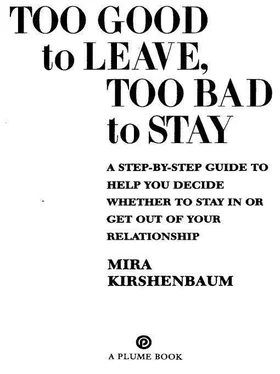Kirshenbaum, Mira - Too Good to Leave, Too Bad to Stay
Здесь есть возможность читать онлайн «Kirshenbaum, Mira - Too Good to Leave, Too Bad to Stay» весь текст электронной книги совершенно бесплатно (целиком полную версию без сокращений). В некоторых случаях можно слушать аудио, скачать через торрент в формате fb2 и присутствует краткое содержание. Жанр: Психология. Описание произведения, (предисловие) а так же отзывы посетителей доступны на портале библиотеки ЛибКат.
- Название:Too Good to Leave, Too Bad to Stay
- Автор:
- Жанр:
- Год:неизвестен
- ISBN:нет данных
- Рейтинг книги:3 / 5. Голосов: 1
-
Избранное:Добавить в избранное
- Отзывы:
-
Ваша оценка:
- 60
- 1
- 2
- 3
- 4
- 5
Too Good to Leave, Too Bad to Stay: краткое содержание, описание и аннотация
Предлагаем к чтению аннотацию, описание, краткое содержание или предисловие (зависит от того, что написал сам автор книги «Too Good to Leave, Too Bad to Stay»). Если вы не нашли необходимую информацию о книге — напишите в комментариях, мы постараемся отыскать её.
Too Good to Leave, Too Bad to Stay — читать онлайн бесплатно полную книгу (весь текст) целиком
Ниже представлен текст книги, разбитый по страницам. Система сохранения места последней прочитанной страницы, позволяет с удобством читать онлайн бесплатно книгу «Too Good to Leave, Too Bad to Stay», без необходимости каждый раз заново искать на чём Вы остановились. Поставьте закладку, и сможете в любой момент перейти на страницу, на которой закончили чтение.
Интервал:
Закладка:
So if they do things not to get their needs met but to maintain power, anything you do to get any of your needs met must be to assert your own power. At least that’s how they see it.
So while Rosemary was working to make her relationship a place where she could take care of herself, Vinnie couldn’t help translating this as a power struggle. He was like the scorpion who stings the frog that’s ferrying him across the river and then drowns along with the frog because he can’t help himself, because that’s just who he is. In the same way, a power person is made stupid in the service of his need for power. Instead of trying to make an entire balanced menu of things work as well as possible, he focuses on power so exclusively he’ll destroy everything else.
So let’s see what your answer to question #7 means. I bet you can predict what this guideline’s going to be:
GUIDELINE #7
If your partner bombards you with difficulties when you try to get even the littlest thing you want, and if almost any need you have somehow gets obliterated, and if whenever you do get something you want it’s such an ordeal that you don’t feel it was worth the effort—then you’ll be happy in the long run if you leave and unhappy, if you stay. Quick take: Power people poison passion.
What if you’re still not sure if your partner’s a passion-poisoning power person? Maybe you can’t get inside his head, but you can see what he does and how it makes you feel.
Power Moves
The things power people do to maintain their power fall into a number of specific categories. Here are the main ones. Watch out for them:
The Best Defense Is a Good Offense. Whatever need you have, power people claim there’s something wrong with you for having that need. They’ll try to make you feel ashamed or guilty. They’ll make you feel sick or weak. They’ll sneer and make you feel inferior. They’ll provide a variety of labels—“defensive,” “neurotic,” “codependent,” the list is endless—so you feel, well, anyone who has this need is like that, and I don’t want to be like that, so I’d better not have that need. These tactics are often hard to notice at first because you’re so busy dealing with your own feelings about there being something wrong with you that it’s hard to focus on what the power person’s really doing.
Power Judo. Why do things the hard way? A lot of power people discover that they can win if they yes you to death. Vinnie, in our example, used power judo at first, and it so lulled Rosemary into thinking that she was going to get what she wanted that she wasn’t prepared when he slipped in his own need by saying he wanted to quickly go and check out the restaurant. The point of these tactics is that instead of opposing you the power person seems to be going along with you by promising you what you’re asking for. But he never delivers.
Snow Jobs. I don’t mean flattery. I’m talking about an overwhelming, distracting blizzard of complication and confusion that so spins you around and turns you upside down that you’re willing to let the power person have everything he wants if only you can find a sliver of peace and clarity. You can be greeted with an emotional uproar, a verbally abusive uproar, a political uproar, an intellectual uproar, even an uproar of busyness and practical details that obliterates your own needs. It doesn’t have to seem like an uproar at all, though. You can be snowed under, for example, by a confusing blizzard of polite considerations all seemingly raised for your benefit.
The Endless Campaign. All you wanted was one simple thing. But the power person keeps coming at you, coming at you, coming at you—battling endlessly over every step and at every possible moment and with renewed energy at every setback. The exhausting relentlessness of this—like a little kid you take to the supermarket who wants you to buy him a certain cereal he’s seen on TV—makes you so sorry you brought up your need in the first place that you not only give up now but you don’t try again for a long time.
Dirty Fighting. Power people scare and intimidate us. They quickly convey a fearless sense that they’ll do anything to get what they want or prevent you from getting what you want. They will literally act crazy if necessary, even though they’re not. One guy, on the occasions when his wife told him he was driving too fast (and evidently he was), would either say, “You think this is fast—I’ll show you fast,” and put the pedal to the floor, scaring her witless. Or, as happened in the middle of sixty-mile-an-hour rush-hour traffic, he’d say, “You want me to slow down—why don’t I just stop,” and he just came to a complete stop in the middle of a four-lane highway. (When this woman first came to see me the first words out of her mouth were “My husband says I need therapy because I’m too emotional.”)
Con Jobs. Your needs make them sick. Literally. Or so they’d have you think. That’s how power people work. One woman learned this at her mother’s knee when as a teenager she told her mother she didn’t want to go to church anymore. Her mother fell on the floor, enacting a full-blown heart attack so convincingly that the daughter called the paramedics. Later, in her own relationship and an accomplished power person in her own right, she’d pull everything from hysterical crying jags to gasping attacks to blinding headaches to get her own way.
Power people will do anything to win. This is how you end up feeling that your needs are obliterated and that it’s not worthwhile to even try to get a need met. Ultimately what this does to you is give you a looking-for-ways-to-do-things-behind-your-partner’s -back attitude.
And the reason you’ll be happiest leaving isn’t only what all this does to you. It’s that any attempts to deal with it or fix it will just seem to your partner like an assault on his power and he’ll have to come back at you with whatever tactics he’s got. You’ll never get the sense that other people in other relationships have, that, “Yes, everything isn’t perfect but we both want to work things out so we both get our needs met.”
You wouldn’t mind having a partner who wanted to get his needs met. You wouldn’t even mind having a partner with whom you had occasional fights as you both tried to get your needs met. But all the people I’ve talked to make it clear that what’s unbearable is to be stuck with a partner whose main need seems to be that you don’t get your needs met.
The Fairness Test
If you’re still not sure whether you’re dealing with a full-blown power person, try the fairness test.
For a particular need you have, and without blaming or attacking or labeling your partner, explain to your partner how it’s simply not fair that things are the way they are now. For example, you might say, “It’s not fair, is it, that we always watch what you want to watch on TV and never watch what I want to watch?” Do they respond to your appeal to fairness?
If they just respond with more power tactics, however confusing or misleading (including the tactic of yessing you to death and then going on to do whatever they want), you know you’re dealing with an incurable power person. There are a lot of strong personalities and a lot of not tremendously sensitive people who are nevertheless fair and will respond productively to the fairness test. Power people will not and cannot.
Power people do what they do because they feel incredibly unsafe unless they’re holding all the reins of power. They feel as unsafe without power as you’d feel vulnerable walking the streets of Manhattan with no clothes on. But your understanding their need for safety doesn’t help you. Their safety is your nightmare.
Читать дальшеИнтервал:
Закладка:
Похожие книги на «Too Good to Leave, Too Bad to Stay»
Представляем Вашему вниманию похожие книги на «Too Good to Leave, Too Bad to Stay» списком для выбора. Мы отобрали схожую по названию и смыслу литературу в надежде предоставить читателям больше вариантов отыскать новые, интересные, ещё непрочитанные произведения.
Обсуждение, отзывы о книге «Too Good to Leave, Too Bad to Stay» и просто собственные мнения читателей. Оставьте ваши комментарии, напишите, что Вы думаете о произведении, его смысле или главных героях. Укажите что конкретно понравилось, а что нет, и почему Вы так считаете.












